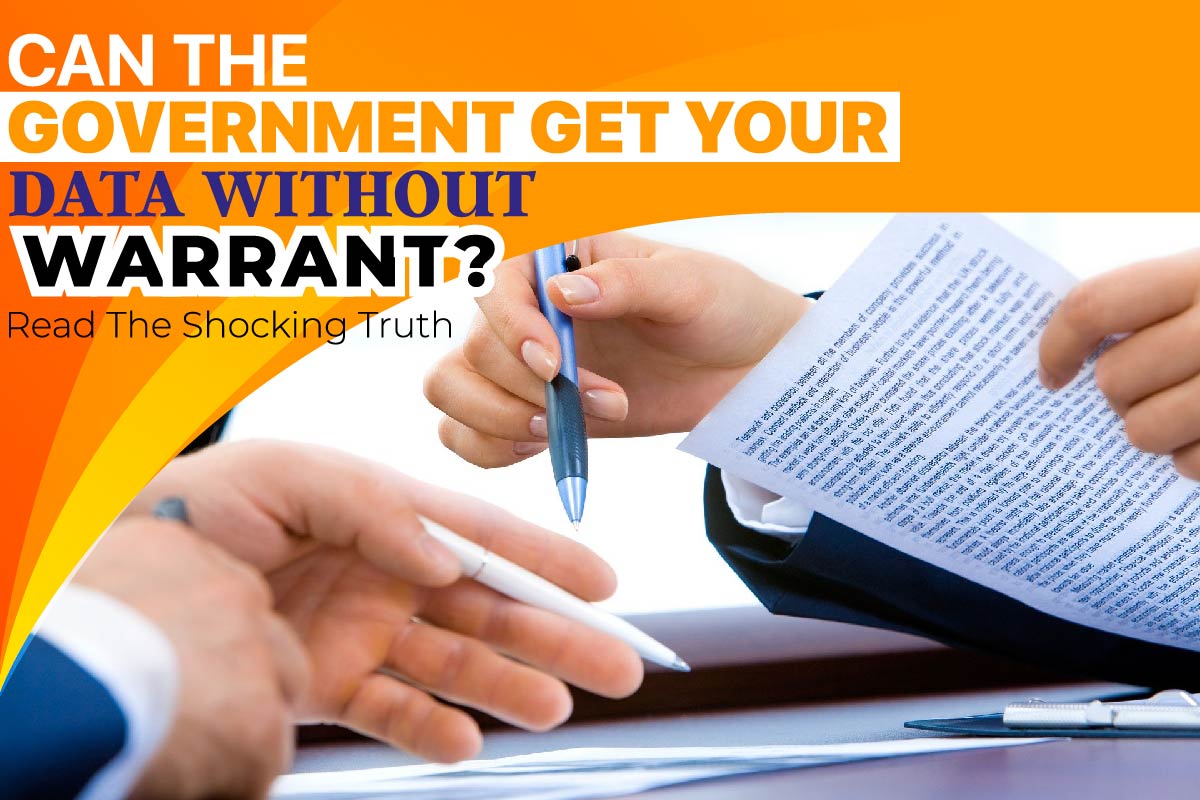As an American citizen, you have civil rights. Ordinarily, a law enforcement agent can invade your privacy without a warrant.
But let’s be honest. The government’s level of surveillance has changed since the 9/11 terrorist attack in America.
The attack didn’t only cause massive loss of lives and properties. It also brought shame to the country, a world power.
Increased surveillance is helpful in the fight against terrorism and other crimes. But then, should law-abiding citizens lose their civil liberty in the process?
Here’s another quick question that has left many people confused.
Can the government get your data without a warrant?
Yes, it’s true. The constitution empowers law enforcement agencies to access American citizens’ and non-citizen data without a warrant.
The reauthorization of the 2001 Patriot Act (passed after the 9/11 terrorist attack) was part of measures to broaden the government’s surveillance power.
So now, the CIA and FBA can get your data without any court warrant. A subpoena is enough to access it.
Continue reading to know more about this topic.
Types Of Data The U.S. Government Access Without Warrant
The government has the power to access diverse data without a warrant. Have that in mind.
Now let’s look into the various data the government focuses on.
Phone records:
Do you know that the government can get your phone records without a warrant? Yes, they can! The FBI and CIA can access your past and previous phone records whenever they want. But they must have a convincing reason. It mustn’t be for personal reasons too.
The phone record will reveal the people you have had contact with and when you contacted them. It will also reveal the phone numbers of the people that have contacted you within a given period.
Phone records can help law enforcement agents to fight or prevent a crime. It can help them unmask criminals, enabling them to act quickly before the criminals can strike again.
When you arrest a criminal, you’re automatically preventing crimes that could have happened to someone in the future or in no distant time. Gaining access to phone records can even help law enforcement agents to solve cases that have gone cold. You never know. The person in question may have committed other offenses authorities weren’t able to solve.
Note: The law grants law enforcement agents the authority to get your phone records without issuing a warrant. The ECPA (Electronic Communication Privacy Act) of 1986 states how authorities can get people’s digital data.
According to the law, internet providers can give the police access to a person’s real-time data once a court order is tendered. The police only require a subpoena to access a user’s historical data.
Location data:
To most people, mobile devices are for phone calls and entertainment. But in reality, they are way more than that. Your mobile phone can serve as a tracker. Law enforcement agents can approach your cell phone carrier to provide your phone’s location.
Cell towers can help in tracking a mobile device. They can tell law enforcement agencies where a device is at or it was last spotted.
In a missing person’s case, access to location data can help law enforcement agencies to locate the victim. The only challenge is that access to location data costs money. Phone carriers do not provide this service free of charge.
Internet service providers also offer location data that proves helpful in tracking a user. The tracking is possible through the user’s computer I.P. address, a unique number assigned to every computer.
A Handy Tip: Just like humans have different fingerprints; no two computers have the same I.P. addresses.
Does law enforcement require a warrant to access a person’s location data? The answer is a bit tricky and complicated.
Judges have given conflicting judgments on this matter in the past. While most courts ruled in favor of state authorities and federal law enforcement agencies, others have ruled against them.
In other words, most courts have asked federal law enforcement agencies and state authorities to obtain a warrant before accessing a person’s location data.
Email messages:
Email messages can provide a great deal of information to help law enforcement in solving a case. Email messages include those sent from or lands in your inbox.
Law enforcement agencies can access your email messages with and without a warrant. If the unopened messages were less than 180 days, they would need a warrant. But if the messages are opened and less than 180 days, law enforcement agents can access them without a warrant.
Email drafts:
A draft refers to an email you were planning to send to someone. It could be an image, text, or any document. A draft is not the same as an email waiting for you to hit the send button. Keep that in mind.
You can send a typed text or uploaded document to draft by clicking on the “save” button or closing the “new message” window. Most people may decide to save important messages or documents on draft with the hope of sending them later.
Like email messages, the government can access email drafts without warrants. Drafts are even a bit easier for investigators to access than recently sent messages. The reason is because of how the law treats them.
Text messages:
Text messages are electronic messages sent from one device to another. You can only write 160 characters on each page.
Can the government get your text messages without a warrant? The straightforward answer is yes. The authorities can access text messages sent by you and those sent by others to you.
What investigators require to access text messages from your cell provider is a subpoena or court order. They don’t need a warrant for this.
The process is the same as email messages. Unopened text messages must be 180 days or older before an investigator can access them without a warrant.
But if the text messages are opened and are less than 180 days, investors don’t need a warrant to access them.
Furthermore, you need to understand that carriers don’t provide text messages to users free of charge. One has to pay a certain fee to access them.
Cloud data:
The ability to store data in the cloud is one of the biggest achievements the tech world has recorded to date. Users can store massive data in the cloud with ease.
Storing data in the cloud offers extra protection from hackers. There’s no need to fret concerning losing your data following a malware attack or system crash.
You can store your photos, documents, and others on the cloud. It doesn’t matter the files’ size.
Now here’s the shocking part. Authorities don’t require a warrant to access your files and documents stored in the cloud.
With a subpoena or court order, law enforcement agents can access your data in Dropbox, Google Drive, SkyDrive, and other services, which support the storing of data in the cloud or on servers.
Social media:
Social media’s emergence is one of the best things that happened to humans in this jet age. Social media is where most of the daily interactions take place.
Most people are comfortable interacting via social media than phone calls or other means. So there’s going to be a reason for the government to source data from social media platforms.
Shockingly, the government can access your data on any social media platform without a warrant. These include Twitter, Facebook, LinkedIn, and other social media platforms in the U.S.
However, like email messages, the government cannot access unopened messages on any social media platform that’s less than 180 days old. But if it’s an already opened message, the authorities don’t need a warrant, even if the message is less than 180 days old.
The government can also get your I.P. address from any social network the same way they obtain it from internet providers. All they need is a court order, indicating that the record in question is crucial for an ongoing investigation.
Internet browser history:
An investigator can use search queries and internet browsing history as evidence in a case. But can they access your search quarries and internet browser history without a warrant? The answer is yes.
The government has the power to collect your browser history without a warrant, thanks to section 215 of the U.S. constitution.
But let’s be clear on one thing. There are limitations regarding the data investigators can access. If you’re an American, investigators only have the power to obtain browser history or search quarries related to counterintelligence or terrorism investigations.
Even if you’re a foreign national, the government can still access your web history for foreign intelligence. Law enforcement agencies have the constitutional powers to do so.
An investigator or the police must seek approval before they can get your data. They can’t just take such decisions on their own.
A Foreign Intelligence Surveillance Court has been established to that effect. The court approves law enforcement agencies’ requests to access a person’s data. The court also consists of 11 federal judges pulled from different parts of the country.
The Foreign Intelligence Surveillance Court is recognized by law and approved by Congress via the Foreign Intelligence Surveillance Act of 1978. The judges have to approve physical search, electronic surveillance, and other investigative actions for foreign intelligence gathering.
Disadvantages Of Empowering The Government To Collect Data Of Citizens Without Warrant
Giving the government the power to collect citizens’ data may have some serious repercussions in the future. The government’s reason might be legitimate.
But let’s not forget that there may be bad elements in the government agency handling this data. Such persons can use the data for selfish reasons.
The government has the power and resources to collect and store data of all Americans for ages. So data collection and storage is never an issue.
The issue is how and who has access to this data. In the hands of any corrupt government, data can be used to oppress innocent citizens. Protesters exercising their civil rights might be singled out and persecuted.
The 1986 Electronic Communications Privacy Act empowers the government to track an American’s location without a warrant. This law was issued in 1986. But today, it’s still effective.
The ECPA isn’t just obsolete. It also leads to the invasion of people’s privacy. America cannot continue to uphold a law that was written at a time when cellphones were non-existent.
Check the United States of America Customers and Border Protection official website. You will discover that they have the power to investigate electronic devices belonging to American citizens and immigrants.
Now here’s the shocking part. If you’re a citizen, the authorities can seize your device for weeks if you refuse them to check your device.
For law-abiding non-citizens, making it difficult for investigators to check your device can have serious consequences. They can deport you without explanation.
Advantages Of Empowering The Government To Collect Data Of Citizens Without Warrant
Empowering the government to collect citizens’ and non-citizens’ data will benefit the country a lot, provided they don’t end up misusing it.
With the data collected, the government can ascertain how a new public policy is fairing. They can determine if the citizens support the policy and areas it can change to make the policy more attractive.
Las Vegas city police have proven why giving the government access to citizens’ data would benefit the country. With data collected, the police determined areas where crimes may likely occur at a given time and day.
The data collected plus access to improved technology can help law enforcement agencies to identify and persecute criminals without breaking a sweat. Law enforcement agencies can deploy facial recognition technology to identify suspects of a crime and save time.
Conclusion
The government can get your data without a warrant. That’s the bitter truth. Even though we are all concerned about our civil liberty invasion, we mustn’t forget the benefits access to data can bring to the country.
The 9/11 terrorist attack made the U.S. government broaden its internal surveillance. No government would want a repeat of what happened on that fateful day.
So, if the price to pay for the government’s counter terrorism efforts to be successful is giving up our civil liberty, then it’s worth it.
You May Like These Articles As Well:
Is Saturday A Business Day For UPS? The Best Shipping Option
What Do CIA Agents Tell Their Family: Everything You Should Know
Is Betting Better If The Presidential Election Is A Close Call?









